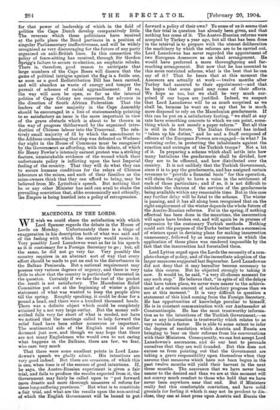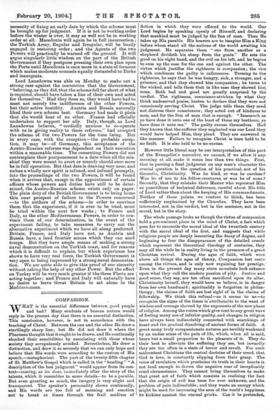MACEDONIA IN THE LORDS.
WE wish we could share the satisfaction with which Lord Spencer regards the debate in the House of Lords on Monday. Unfortunately there is a tinge of exaggeration in his description both of what was said and of the feeling with which the country would receive it. Very possibly Lord Lansdowne went as far in his speech as it is customary for a Foreign Secretary to go ; but, all the same, he did not go very far. Very possibly the country requires in an abstract sort of way that every effort should be made to put an end to the disturbances in the Balkan Peninsula. But a national requirement may possess very various degrees of urgency, and there is very little to show that the country is particularly interested in the question. Certainly if we take the test of the pocket the , result is not satisfactory. The Macedonian Relief Committee put out at the beginning of winter a plain statement of what was wanted to keep the people alive till the spring. Roughly speaking, it could be done for a pound a head, and there were a hundred thousand heads. There was a definite object which could be completely attained by a not very large outlay. But the money sub- scribed falls very far short of what is needed, nor, have we noticed that the meetings called to help forward the relief fund have been either numerous or important. The sentimental side of the English mind is rather dormant just now, and though we may hope that there are not many Englishmen who would own to not caring what happens in the Balkans, there are few, we fear, who care very much That there were some excellent points in Lord Lans- dorne's speech we gladly admit. His intentions are very good indeed. But there are occasions, of which this is one, when time is of the essence of good intentions. If, he says, the Austro-Russian experiment is .given a fair trial, and fails to produce the results expected from it, the Government may fairly be called upon- to " put forward more drastic and more thorough measures of reform for these long-suffering provinces." But what is to constitute a fair trial, and what are the results upon the non-arrival of which the English Government will be bound to put forward a policy of their own? To some of us it seems that the fair trial in question has already been given, and that nothing has come of it. The Austro-Russian reforms were accepted by Turkey a year ago, but all that has been done in the interval is to prepare with the utmost deliberation the machinery by which the reforms are to be carried out. Lord Lansdowne has never regarded the appointment of two European Assessors as an ideal arrangement. He would have preferred a more thoroughgoing and far- reaching arrangement. But now that he has assented to this more restricted scheme, what is the best that he can say of it ? That he hears that at this moment the- Assessors are actually at work twelve months after Turkey had assented to their appointment—and that he hopes that some good may come of their efforts. We hope so too, but we shall be very much .sur- prised if our hopes are justified. Indeed, we suspect that Lord Lansdowne will be as much surprised as we shall be, because he went on to say that he is much more disposed to rely on the Macedonian gendarmerie. If this can be put on a satisfactory footing, "we shall at any rate have something concrete to which we can point, some- thing which is not merely a paper reform." But all this is still in the future. The Italian General has indeed " taken up his duties," and he and a Staff composed of officers of the European Powers are engaged—in what ? In restoring order, in protecting the inhabitants against the exaction and outrages of the Turkish troops ? Not a bit of it. In preparing a scheme which shall settle into how many battalions the gendarmerie shall be divided, how they are to be officered, and how distributed. over the country. It is not unlikely that the Turkish Government, since it is to pay the gendarmerie, and has assigned. certain revenues to " provide a financial basis " for this operation, will claim the right to have a voice in the settlement of each of these particulars ; and if so, it is not difficult to calculate the chances of the services of the gendarmerie being available within any reasonable time. But in this case any further delay will be fatal to the scheme. The winter is passing, and it has all along been recognised that on the right employment of the winter depends the whole future of the Austro-Russian reforms. For in the spring, if nothing- effectual has been done in the meantime, the insurrection will again have broken out, and will again be in process of repression by the customary Turkish methods. Nothing. could suit the purpose of the Turks better than a succession of winters spent in devising plans for making insurrection unnecessary, followed by as many summers in which the application of these plans was rendered impossible by the fact that the insurrection had forestalled them.
Lord. Lytton urged upon the Lords the necessity of a com- plete change of policy, and of the immediate adoption of the larger measures suggested last September. Lord. Lansdowne- did not deny that it may hereafter become necessary to take this course. But he objected strongly to taking it now.. It would be, he said, " a very ill-chosen moment for any such step." He believes that, " in spite of all the delays. that have taken place, we never were nearer to the achieve- ment of a certain amount of satisfactory progress than we are at this moment." It is very difficult to question a statement of this kind coming from the Foreign Secretary. He has opportunities of knowledge peculiar to himself. He is in constant communication with our Ambassador at Constantinople. He has the most trustworthy informa- tion as to the intentions of the Turkish Government,—so far as any information is trustworthy which relates to so very variable a factor. He is able to some extent to infer the degree of resolution which Austria and Russia are bringing to bear on their reforms from his conversations with their Ministers. Consequently, we can but accept Lord. Lansdowne's assurances, and do our best to persuade ourselves that they are well founded. But this does net excuse us from pointing out that the Government are taking a grave responsibility upon themselves when they assume that measures which have not been begun in the past twelve months will yield their harvest m the next three months. The assurance that we have never been nearer to the desired end. than we are at this moment will. not convey much comfort to those who hold that we have never been anywhere near that end. But if Ministers - really feel this comfortable conviction, and have solid grounds for feeling it which it may not be prudent to dis- . close, they can at least press upon Austria and Russia tha
necessity of fixing an early date by which the scheme must be brought up for judgment. If it is not in working order before the winter is over, it may as well not be in working order at all. Macedonia will again be in full insurrection ; the Turkish Army, Regular and Irregular, will be busily engaged in restoring order ; and the Agents of the two Powers will practically be warned off the ground. It will argue singularly little wisdom on the part of the British Government if they postpone pressing their own plan upon the Porte until Macedonia is once more in a state of ferment which makes moderate counsels equally distasteful to Turks and insurgents.
Lord Lansdowne was able on Monday to make out a strong case against the contention that the Government, "believing, as they did, that the scheme fell far short of what is required, should have taken a line of their own and acted for themselves." Had they clone so, they would have had to meet not merely the indifference of the other Powers, but their active hostility. Austria and Russia naturally liked their own scheme best. Germany had made it plain that she would hear of no other. France had officially undertaken to support her ally. Italy, though, as Lord Lansdowne believes, " cordially anxious to co-operate with us in giving reality to these reforms," had accepted the scheme of the two Powers for the time being. But in every case, with the exception—the probable excep- tion, it may be—of Germany, this acceptance of the Austro-Russian reforms was dependent on their execution within a reasonable time. The consenting Powers did not contemplate their postponement to a date when all the mis- chief they were meant to avert or remedy should once more be in full operation. But that date is drawing very near, and unless a wholly new spirit is infused, and infused promptly, into the proceedings of the two Powers, it will be found when it arrives that, except in the appointment of certain officers whose powers and duties have still to be deter- mined, the Austro-Russian scheme exists only on paper. The plain duty of the British Government is to bring home this near prospect of failure to the Powers concerned —to the authors of the scheme—in order to convince them that the experiment, if it is ever to be tried, must be tried within the next few weeks ; to France and Italy, as the other Mediterranean Powers, in order to con- vince them of our determination, in the event of the experiment failing, to take measures to carry out the alternative experiment which we have all along preferred. Britain, France, and Italy have not, as Austria and Russia have, a land frontier across which they can send troop's. But they have ample means of making a strong naval demonstration on the Turkish coast, and for reasons which it is difficult to explain, but which experience has shown to have very real force, the Turkish Government is very open to being impressed by a strong naval demonstra- tion. We are quite able to give this proof of our sincerity without asking the help of any other Power. But the effect on Turkey will be very much greater if the three Fleets are acting together ; and France and Italy will naturally have no desire to leave Great Britain to act alone in the Mediterranean.











































 Previous page
Previous page